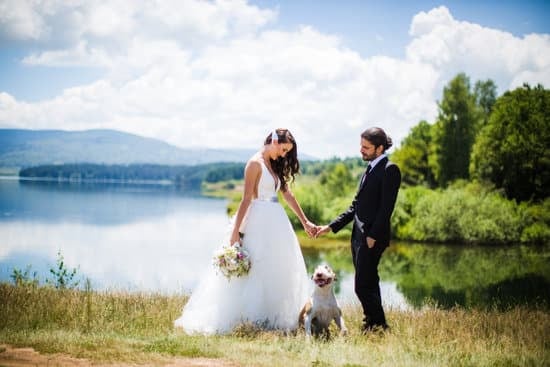When planning a wedding, one of the important decisions to make is who can officiate the ceremony. The officiant plays a significant role in leading the couple through their vows and the ceremonial exchange of rings. In addition to setting the tone for the celebration, they also hold legal responsibilities as well. But who can officiate a wedding? The answer varies depending on several factors, including religious beliefs, state laws, and personal preferences.
The role of an officiant goes beyond simply leading the ceremony-it also involves legally binding the marriage. As such, understanding the legal requirements for wedding officiation is crucial. Each state has its own set of regulations regarding who can perform weddings, which may include specific licensing or ordination requirements. It’s important for couples to familiarize themselves with these legal aspects before selecting an officiant for their special day.
In addition to recognizing religious leaders as legitimate wedding officiants, there has been a rise in non-religious or secular officiants as well. This trend reflects a growing diversity of beliefs and practices among couples getting married. From judges and magistrates to online-ordained individuals and even friends or family members, there are various options available for those seeking a personalized and unique officiant experience.
Legal Requirements for Wedding Officiation
When it comes to who can officiate a wedding, there are specific legal requirements that vary by state. In the United States, each state has its own regulations regarding who is authorized to perform weddings. Generally, ordained ministers, religious leaders, judges, magistrates, and other civil officiants are allowed to officiate weddings. However, some states also allow individuals who have been ordained through online organizations to legally solemnize a marriage.
In most states, becoming an ordained minister or religious leader is relatively straightforward. Many religious denominations and organizations offer ordination programs that provide individuals with the authority to officiate weddings. Additionally, individuals interested in becoming a civil officiant can often apply for a one-time authorization from the appropriate government office.
It’s important for couples to research and understand the legal requirements in their specific location before choosing an officiant. This ensures that their marriage ceremony is valid and legally recognized. Whether opting for a religious, non-religious, or civil officiant, knowing the legal requirements for wedding officiation is crucial in planning a wedding.
| State | Requirements |
|---|---|
| Texas | Ordained ministers or religious leaders; judges; justices of the peace; elected officials such as mayors or county clerks |
| California | Religious leaders; active and retired judges; commissioners of civil marriages; current and former mayors |
| New York | Clergy members; mayors; county executives; certain other public officials designated by law |
Religious Officiants
When it comes to the question of who can officiate a wedding, religious leaders often come to mind as one of the most common options for couples. Religious officiants play a significant role in performing wedding ceremonies and are responsible for guiding couples through this important milestone in their lives. They provide spiritual guidance and blessings, incorporating religious traditions and customs into the ceremony.
Requirements for religious officiants vary depending on the specific religion and denomination. For example, in Christianity, clergy members such as priests, ministers, pastors, and rabbis are generally authorized to officiate weddings. These religious leaders usually have strict requirements and undergo extensive training or education through theological seminaries or institutions associated with their respective faiths. Additionally, they may need to be endorsed by their church or religious organization in order to perform legally binding marriages.
Furthermore, some religions have traditional rituals or procedures that must be followed during the marriage ceremony. For instance, Catholic weddings require the officiant to adhere to specific liturgical guidelines established by the church. It is important for couples considering a religious officiant to carefully research and understand the requirements set forth by their chosen denomination to ensure that their marriage is legally recognized.
| Religious Affiliation | Requirements for Officiants |
|---|---|
| Christianity | Clergy members authorized; theological education and church endorsement usually required |
| Judaism | Rabbis typically officiate; adherence to specific liturgical guidelines required |
| Buddhism | Meditation teachers or Buddhist monks can act as officiants based on individual temple traditions |
Non-Religious Officiants
The rise of non-religious or secular officiants has become a popular choice for couples looking to personalize their wedding ceremonies. As society becomes more diverse and individuals identify with a wide range of beliefs and spiritual practices, the demand for non-religious officiants has increased. Here are some types of individuals who can officiate a wedding without religious affiliation:
- Friend or Family Member: Many couples choose to have a close friend or family member serve as the officiant for their wedding. This allows for a more personal and intimate ceremony, as the individual knows the couple on a deep and meaningful level. It also adds a special touch to the ceremony, as someone close to the couple is guiding them through this important milestone.
- Professional Officiant: There are professional officiants who specialize in non-religious ceremonies. These individuals are often trained in public speaking, event planning, and ceremonial rituals. They work closely with couples to create custom wedding scripts that reflect their values, beliefs, and love story.
- Humanist Celebrant: Humanist celebrants are trained professionals who conduct humanist, secular, and non-religious weddings. They focus on celebrating love and commitment in a way that reflects the couple’s personal beliefs rather than traditional religious doctrines. Humanist celebrants work with couples to create unique and meaningful ceremonies that align with their values.
Choosing a non-religious officiant allows couples to create a wedding ceremony that is authentic to their beliefs and values while ensuring that their union is legally recognized. It is important for couples to research and understand the legal requirements in their specific location when considering a non-religious officiant for their wedding.
Civil Officiants
Role of Civil Officiants
Civil officiants play a crucial role in officiating weddings for couples who may not have religious affiliations or prefer a non-religious ceremony. Judges, magistrates, and other civil officials are authorized to legally solemnize marriages and oversee the marriage ceremony. Civil officiants provide an alternative option for couples who do not want a religious wedding but still desire a formal and legal union.
Legal Requirements for Civil Officiants
The legal requirements for civil officiants vary by state and jurisdiction. In some states, judges and magistrates can officiate weddings without any additional registration or licensing requirements. However, in other states, civil officiants may need to obtain specific authorization, complete paperwork, or undergo a registration process with the local government in order to legally perform wedding ceremonies. It is important for couples to research the legal requirements in their specific location when considering a civil officiant for their wedding.
Choosing a Civil Officiant
When choosing a civil officiant for their wedding, couples should consider factors such as availability, experience, and personal connection. It is advisable to meet with potential civil officiants before making a decision to ensure that they are comfortable with the individual who will be overseeing their marriage ceremony. Additionally, couples should inquire about any legal documentation or procedures that need to be completed prior to the wedding day when working with a civil officiant.
Overall, civil officiants provide an important option for couples seeking a non-religious wedding ceremony. By understanding the role and legal requirements of civil officiants, couples can make informed decisions about who can best fulfill this essential role on their special day.
Online Ordination and Officiation
In recent years, there has been a noticeable trend towards online ordination for individuals seeking to officiate weddings. This method of becoming an ordained officiant provides an accessible and convenient way for people to legally perform marriage ceremonies. There are various online platforms and religious organizations that offer ordination services, allowing individuals to become recognized wedding officiants.
Some popular online ordination websites include Universal Life Church, American Marriage Ministries, and the Universal Ministries. These platforms typically require individuals to fill out an application, and in some cases, pay a small fee. Once ordained, individuals have the legal authority to perform marriages in many states across the United States. However, it’s important for ordained officiants to be aware of the specific legal requirements in the state where they plan on officiating a wedding.
Here are some key points to consider about online ordination:
- Online ordination offers convenience and accessibility for individuals who wish to become wedding officiants.
- It is essential for ordained officiants to research and understand the legalities of performing marriages in their specific state.
- While online ordination is a viable option for many people, it is crucial to ensure that all legal requirements are met before officiating a wedding ceremony.
Personalized and Unique Officiants
In recent years, there has been a growing trend towards personalized and unique officiants for wedding ceremonies. Couples are increasingly opting for a non-traditional approach by choosing friends or family members to officiate their weddings, adding a special and meaningful touch to the ceremony. This shift reflects a desire for more personalized and intimate wedding experiences that truly reflect the couple’s values and relationships.
Legal Considerations
When considering a personalized or unique wedding officiant, it is important to understand the legal requirements in your specific location. Not all states or countries allow for non-traditional officiants, and there may be specific criteria that must be met in order for the marriage to be legally recognized. It is essential to research the legal implications of having a friend or family member as the officiant, as it can vary widely depending on the location.
Creating a Meaningful Ceremony
One of the main reasons couples choose personalized officiants is to create a more meaningful and personal ceremony. Having someone who knows the couple well and has played a significant role in their lives can add emotional depth and authenticity to the ceremony. It allows for customized vows, personal anecdotes, and a more heartfelt experience overall.
The Importance of Preparation
While choosing a friend or family member as an officiant can add great sentimental value to the wedding ceremony, it is important to ensure that they are prepared for the role. Officiating a wedding comes with its own set of responsibilities, from obtaining necessary paperwork to leading the ceremony effectively, so it’s crucial that your chosen individual is committed to fulfilling these duties professionally.
How to Choose the Right Officiant
Choosing the right officiant for your wedding is an important decision, as they play a crucial role in the ceremony. When considering who can officiate a wedding, it is essential to take into account various factors such as personal beliefs, legal requirements, and the overall feel you want for your special day.
One of the first things to consider when choosing an officiant is their compatibility with your beliefs and values. For religious ceremonies, it is customary to have a religious leader officiate the wedding, while non-religious or secular ceremonies provide more flexibility in choosing an officiant. It’s important to have open and honest conversations with potential officiants to ensure that their approach aligns with your vision for the ceremony.
Another important aspect to consider when choosing an officiant is their ability to personalize the ceremony according to your preferences. Whether it’s adding personal anecdotes, cultural traditions, or specific vows, finding an officiant who is willing and able to accommodate these requests can make your ceremony even more meaningful.
In addition to compatibility and personalization, it’s essential to research and understand the legal requirements in your specific location before choosing an officiant. Different states and countries have varying regulations regarding who can legally perform a marriage ceremony.
It’s crucial to ensure that your chosen officiant meets all necessary legal requirements to avoid any complications later on. Taking the time to carefully select the right wedding officiant who meets both your personal and legal criteria can greatly enhance your overall wedding experience.
Conclusion
In conclusion, there are a variety of options for who can officiate a wedding, catering to the diverse needs and preferences of couples. From religious officiants to non-religious and civil officiants, as well as the rise of personalized and unique officiants, there is no shortage of choices when it comes to selecting someone to oversee your wedding ceremony.
It is important for couples to carefully consider their specific desires and the legal requirements in their location before making this decision.
With the growing trend of online ordination, more individuals have the opportunity to become legally recognized wedding officiants. This has opened up new possibilities for couples seeking a non-traditional officiant, such as friends or family members, to play this significant role in their special day. However, it is crucial for couples to research and understand the legalities surrounding online ordination in their area before moving forward with this option.
Ultimately, choosing the right wedding officiant is a personal decision that should reflect the values and beliefs of the couple getting married. Compatibility, personalization, and legal considerations all play important roles in ensuring that the chosen officiant is the perfect fit for overseeing this momentous occasion. By being informed about their options and understanding the legal requirements involved, couples can confidently select an officiant who will help make their wedding ceremony unforgettable.
Frequently Asked Questions
What Is Required to Officiate a Wedding in California?
In California, to officiate a wedding, one must be at least 18 years old and legally ordained. The ordination can be obtained through religious organizations or online ministries. Additionally, the officiant must register with the county clerk.
What Is Required to Officiate a Wedding in Florida?
To officiate a wedding in Florida, the individual must be at least 18 years old and ordained by a religious organization or through an online ministry. There is no registration required with the state, but it’s recommended to connect with the local marriage authority.
Who Can Perform a Marriage in NY?
In New York, a marriage can be performed by clergy or officiants who are authorized by a religious group and registered with the city or town clerk. Justices of the Supreme Court and judges of the Court of Appeals can also solemnize marriages in NY.

Welcome to my blog about home and family. This blog is a place where I will share my thoughts, ideas, and experiences related to these important topics. I am a stay-at-home mom with two young children. I hope you enjoy reading it! and may find some helpful tips and ideas that will make your home and family life even better!





